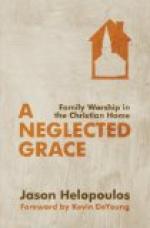What are the natural elements of home-sympathy? The original meaning of sympathy is “harmony of the affections.” As such it is an instinctive element of human nature. “Sympathy,” says Adams in his Elements of Christian Science, “is a natural harmony by which, upon matters especially that concern the affections, one human being shall, under certain conditions, feel, feel in despite of all concealment of language, the real state of the other.” It is, in a word, that law of our nature which makes the feeling of one become affected in the same way as are the feelings of another, so that, in obedience to this law, “we rejoice with them that rejoice, and weep with them that weep.” In order to this the motive need not be the same in those in whom the feeling is the same; for that feeling engenders a feeling of its own kind in the other, independent of similar motive. Home-sympathy is that primary power of the heart by which all the affections of one member are extended to all the other members. It awakens in each for all the others, those delicate sensibilities which impel to the most self-denying and benevolent acts. The parent who sympathizes with the child, will extend to it all the aids within a parent’s ability.
Its nature is to yield more of itself to weeping than to rejoicing, to misery than to joy. The parent will exert more power and do more for the wretched child than for those of his children who are not in the same condition. He will leave the latter in their security, and seek the one lost sheep of his little flock. Thus it exerts a sheltering influence against the dangers and miseries of human life. It is the law of home-preservation, written upon the heart, obeyed by the affections, and impelling each member to yield a voluntary devotion to the welfare of all the others. It is this which makes it one of the most lovely attributes of home. It is one of the golden chains that link its members together in close unity, making one heart of the many that are thus fused together, and blending into beautiful unison their specific feelings, and hopes and interests.
It is, therefore, the law of oneness in the family, weaving together, like warp and woof, the existence of the members, and locking each heart into one great home-heart, “like the keys of an organ vast,” so that if one heart be out of tune, the home-heart feels the painful jar, and gives forth discordant sounds. By it we are not only bound to our kindred, but to our friends, our nation, our race. It impels us to all our acts of benevolence even to an enemy. Earth would be a dreary scene, and society would be a curse, if it did not reign in human nature.




